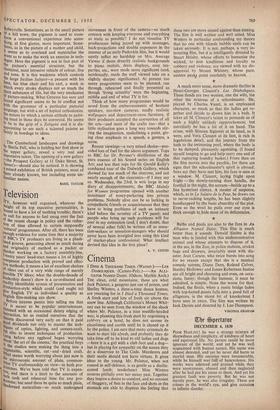Cinema
I DIED A THOUSAND TIMES. (Warner.)—LES DIABOLIQUES. (Cameo-Poly.)—AN ALLI- GATOR NAMED DAISY. (Odeon, Marble Arch.) THE clean, cold mountains; these are what Jack Palance, a gangster just out of prison, and Shelley Winters, a dime-a-time dance hostess, are yearning for in 'I Died a Thousand Times. A fresh start and lots of fresh air above the snow line. Although California's Mount Whit- ney can be seen from the window of the shack where Mr. Palance, in a nice muddle-headed way, is planning this fresh start by organising a robbery on a hotel, he does not savour its cleanliness and coolth until he is chased up it by the police. I am sure that many criminals do want to start life afresh, and probably they do take time off to be kind to old ladies and dogs —here it is a girl with a club foot and a dog— but in playing for sympathy on the screen they do a disservice to The Code. Murderers and their molls should not have virtues. It gives ideas to the young. Mr. Palance, when not roused in self-defence, is as gentle as a disillu- sioned lamb; tenderheart Miss Winters mourns pitifully over her messy past. Together they inspire a desire to comfort, and no amount of thuggery, of fists in the face and shots in the stomach are able to disperse the feeling that
these two are more sinned against than sinning. The film is well written and well acted, Miss Winters in particular confounding my theory that no one with blonde bubble curls can be taken seriously. It is not, perhaps, a very in- teresting film, but it is intelligently directed by Stuart Heisler, whose efforts to humanise the wicked, to join kindliness and loyalty to robbery and violence, are viewed with icy dis- approval by Mount Whitney, whose pure, austere peals point resolutely to heaven.
A much more tense, more dramatic thriller is Henri-Georges Clouzot's Les Diaboliques. These fiends are two women, one the wife, the other the mistress of a schoolmaster. He, played by Charles Vanel, is an unpleasant character, so much so that the ladies get to- gether and decide to drown him in a bath. It takes all M. Clouzot's talent to persuade us of such a highly unlikely rapprochement, but mercifully he has a lot of it on hand. The crime, with Simone Signoret at its head, as it were, and Vera Clouzot at its feet, is rich in lugubrious detail, and the journey from the bath to the swimming pool, where the body is to be dumped, pleasantly agonising. (I found myself longing to go and help carry one end of that rupturing laundry basket.) From then on the film moves into the psychic, for there are signs that the schoolmaster's spirit is abroad; boys say they have met him, his face is seen at a window. M. Clouzot, laying fright upon fright — the slowly-turning door handle, the footfall in the night, the scream—builds up to a fine hysterical climax. A master of suspense, which, as in Le Salaire de la Peur, he draws out to nerve-racking lengths, he has been slightly handicapped by the basic absurdity of the plot. Even so the wool he pulls over our eyes is thick enough to hide most of its deficiencies.
*
Baths and pools are also to the fore in An Alligator Named Daisy. This film is much better than it sounds. Donald Sinden is the man who is landed with this undemonstrative animal and whose attempts to dispose of it, in the sea, in the Zoo, in police stations, cricket bags and drawers, invariably meet with dis- aster. Jean Carson, who twice bursts into song for no reason except that she is a musical comedy actress, Diana Dors, Roland Culver, Stanley Holloway and James Robertson Justice are all bright and charming and even, on occa- sions, funny; though the humour, it must be admitted, is simple. None the worse for that. Indeed, the finale, when a rustic bridge laden with top-hatted guests falls into a pond full of alligators, is the nicest bit of knockabout I have seen in years. The film was written by Jack Davies and directed by J. Lee-Thompson. VIRGINIA GRAHAM


































 Previous page
Previous page